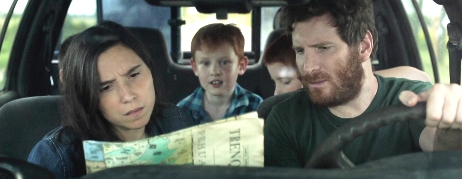 A mystery from Argentina becomes a meditation on love, art, and the agency of women.
A mystery from Argentina becomes a meditation on love, art, and the agency of women.
Trenque Lauquen, a film by Argentine director Laura Citarella, presents a two-part mystery. First, the mystery of things we investigate to learn more about them. Second, the mystery of things that are beyond what we can fully know.
The story takes place in and around Trenque Lauquen, a small city in central Argentina. Laura, a young botanist played by Laura Paredes, has gone missing, and her boyfriend, a university professor played by Rafael Spregelburd, searches the area trying to find her, with the help of her married friend Chicho, played by Ezequiel Pierri. Chicho is at first a baffling and rather amusing character, a shaggy teddy bear type of guy, who responds to someone talking to him with thoughtful silence much of the time, hardly ever smiling, even appearing a bit dumb, but we eventually find that there’s a lot more to him.
The film jumps back in time where we see that Chicho was assisting Laura in the search for samples of different types of orchids, and that she needed one more plant to complete her study. But one day, as they meet at her favorite restaurant, she tells him that she has stumbled upon a mystery, one that has nothing to do with plants. It so happens that Laura also does guest spots on a local radio news show about women’s history. She checked a book out of the library called “Autobiography of a Sexually Emancipated Communist Women” by a Russian author (I found out later that this was a real book), and hidden between some glued pages she found a love letter. Following clues contained in the letter, she checked out other books and found more letters. A married man, who it turns out was a wealthy Italian landowner, wrote these deeply passionate and erotic letters many years ago to a local woman teacher, who then hid them all in these books that were donated to the library after she died. Who exactly were these lovers, and in what circumstances did they meet? Laura enlists Chicho to help solve the mystery.
Laura Paredes, who co-wrote the screenplay with Citarella, draws us totally into her character’s curious and imaginative world. She is the star whose presence is felt throughout the film, even in scenes where she’s absent. As Chicho helps Laura find evidence about the two mystery lovers, we can see him gradually falling in love with her. Meanwhile we still follow the boyfriend Rafael in his search, and the contrast between his rigid, uptight personality and what we have seen of Laura’s intuitive openness is remarkable.
Trenque Lauquen is a four-hour film, originally screened in two separate two-hour parts. Citarella’s style is sensuous, beguiling, and featuring many shifts back and forth in time. In part two, Laura’s discovery of the missing variety of orchid leads to a new mystery about a strange creature, either a feral child or an animal. This part becomes an increasingly enigmatic dive into questions about identity—of oneself, of women, of our being in nature without our customary labels, of that within is which is unknowable.
Trenque Lauquen is a beautiful tapestry of stories within stories, just the kind of free-spirited film that I admire.

A street kid fights for survival in Lebanon, in Nadine Labaki’s heart wrenching new film. Nadine Labaki is a Lebanese writer-director whose three feature...

The great director, known for his versatility, was an independent who jumped to whatever studio would hire him at the moment, never with a...

The true story of a large Romanian family living in a wilderness area facing the threat of being forced to move to the big...